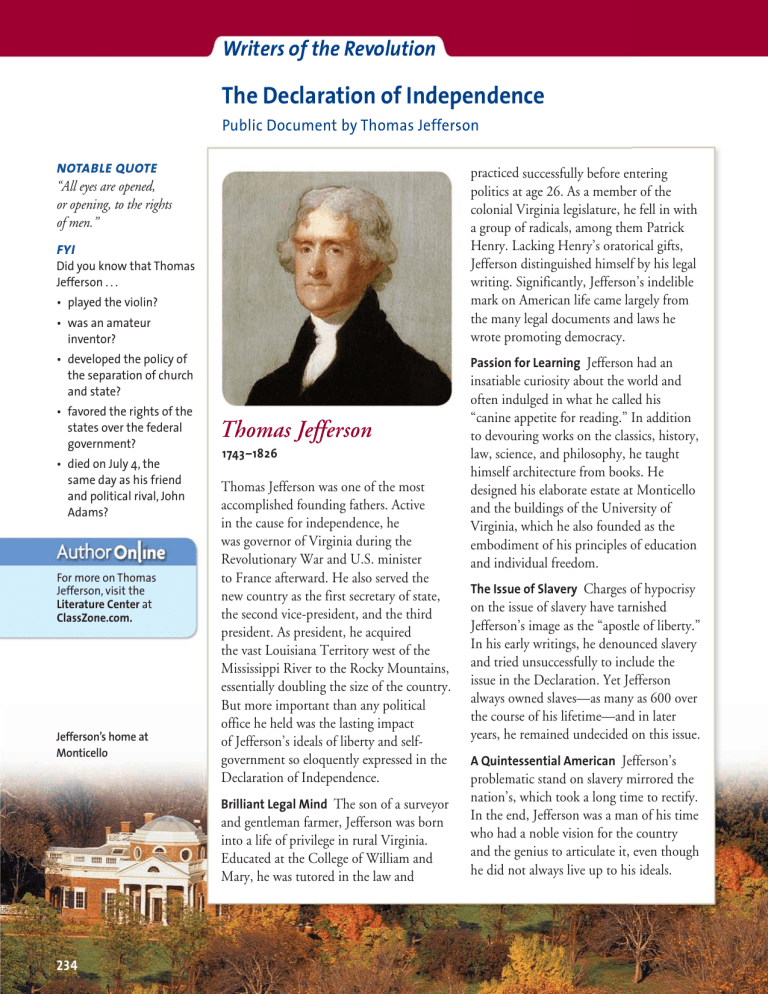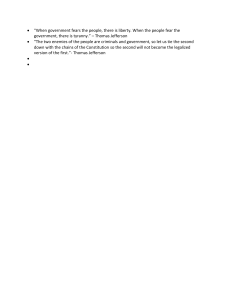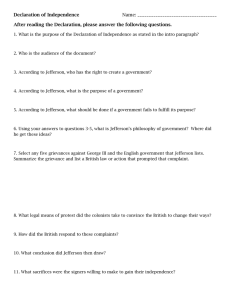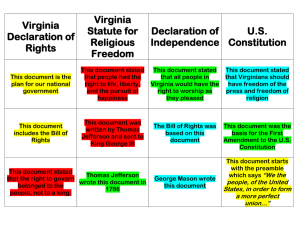
Writers of the Revolution The Declaration of Independence Public Document by Thomas Jefferson notable quote practiced successfully before entering politics at age 26. As a member of the colonial Virginia legislature, he fell in with a group of radicals, among them Patrick Henry. Lacking Henry’s oratorical gifts, Jefferson distinguished himself by his legal writing. Significantly, Jefferson’s indelible mark on American life came largely from the many legal documents and laws he wrote promoting democracy. “All eyes are opened, or opening, to the rights of men.” fyi Did you know that Thomas Jefferson . . . • played the violin? • was an amateur inventor? • developed the policy of the separation of church and state? • favored the rights of the states over the federal government? • died on July 4, the same day as his friend and political rival, John Adams? For more on Thomas Jefferson, visit the Literature Center at ClassZone.com. Jefferson’s home at Monticello Thomas Jefferson 1743–1826 Thomas Jefferson was one of the most accomplished founding fathers. Active in the cause for independence, he was governor of Virginia during the Revolutionary War and U.S. minister to France afterward. He also served the new country as the first secretary of state, the second vice-president, and the third president. As president, he acquired the vast Louisiana Territory west of the Mississippi River to the Rocky Mountains, essentially doubling the size of the country. But more important than any political office he held was the lasting impact of Jefferson’s ideals of liberty and selfgovernment so eloquently expressed in the Declaration of Independence. Brilliant Legal Mind The son of a surveyor and gentleman farmer, Jefferson was born into a life of privilege in rural Virginia. Educated at the College of William and Mary, he was tutored in the law and 234 Passion for Learning Jefferson had an insatiable curiosity about the world and often indulged in what he called his “canine appetite for reading.” In addition to devouring works on the classics, history, law, science, and philosophy, he taught himself architecture from books. He designed his elaborate estate at Monticello and the buildings of the University of Virginia, which he also founded as the embodiment of his principles of education and individual freedom. The Issue of Slavery Charges of hypocrisy on the issue of slavery have tarnished Jefferson’s image as the “apostle of liberty.” In his early writings, he denounced slavery and tried unsuccessfully to include the issue in the Declaration. Yet Jefferson always owned slaves—as many as 600 over the course of his lifetime—and in later years, he remained undecided on this issue. A Quintessential American Jefferson’s problematic stand on slavery mirrored the nation’s, which took a long time to rectify. In the end, Jefferson was a man of his time who had a noble vision for the country and the genius to articulate it, even though he did not always live up to his ideals. The Declaration of Independence T homa s Jeffers on background In September 1774, 56 delegates met in Philadelphia at the First Continental Congress to draw up a declaration of colonial rights. They agreed to reconvene in May 1775 if their demands weren’t met. At this Second Continental Congress, Thomas Jefferson joined Benjamin Franklin and John Adams on the committee to draft the Declaration of Independence. The task of writing it fell to Jefferson. Although Congress made many changes to the list of grievances, Jefferson’s declaration of rights remained untouched—an abiding testament to “self-evident” truths for the nation and the world. 10 In Congress, July 4, 1776 When, in the course of human events, it becomes necessary for one people to dissolve the political bands which have connected them with another, and to assume, among the powers of the earth, the separate and equal station to which the laws of nature and of nature’s God entitle them, a decent respect to the opinions of mankind requires that they should declare the causes which impel them to the separation. a We hold these truths to be self-evident:—That all men are created equal; that they are endowed by their Creator with certain unalienable rights; that among these are life, liberty, and the pursuit of happiness. That, to secure these rights, governments are instituted among men, deriving their just powers from the consent of the governed; that, whenever any form of government becomes destructive of these ends, it is the right of the people to alter or to abolish it, and to institute a new government, laying its foundation on such principles, and organizing its powers in such form, as to them shall seem most likely to effect their safety and happiness. Prudence, indeed, will dictate that governments long established should not be changed for light and transient causes; and, accordingly, 236 unit 1: early american writing ANALYZE VISUALS This is an original copy of the Declaration. What might be some of the advantages of having the whole document appear on one large sheet of paper? impel (Gm-pDlP) v. to drive forward; force a ARGUMENT What claim does Jefferson present in the preamble of the Declaration and what support does he say he will provide? unalienable (On-AlPyE-nE-bEl) adj. not to be taken away (Today the usual form is inalienable.) 20 30 40 50 all experience hath shown that mankind are more disposed to suffer, while evils are sufferable, than to right themselves by abolishing the forms to which they are accustomed. But, when a long train of abuses and usurpations, pursuing invariably the same object, evinces a design to reduce them under absolute despotism, it is their right, it is their duty, to throw off such government, and to provide new guards for their future security. Such has been the patient sufferance of these colonies; and such is now the necessity that constrains them to alter their former systems of government. The history of the present King of Great Britain1 is a history of repeated injuries and usurpations, all having, in direct object, the establishment of an absolute tyranny over these States. To prove this, let facts be submitted to a candid world. b He has refused his assent to laws 2 the most wholesome and necessary for the public good. c He has forbidden his Governors to pass laws of immediate and pressing importance, unless suspended in their operation till his assent should be obtained; and, when so suspended, he has utterly neglected to attend to them. He has refused to pass other laws for the accommodation of large districts of people, unless these people would relinquish the right of representation in the legislature—a right inestimable to them, and formidable to tyrants only. He has called together legislative bodies at places unusual, uncomfortable, and distant from the depository of their public records, for the sole purpose of fatiguing them into compliance with his measure. He has dissolved representative houses repeatedly, for opposing, with manly firmness, his invasions on the rights of the people. He has refused, for a long time after such dissolutions, to cause others to be elected; whereby the legislative powers, incapable of annihilation, have returned to the people at large for their exercise; the State remaining, in the meantime, exposed to all dangers of invasion from without, and convulsions within. He has endeavored to prevent the population3 of these States; for that purpose obstructing the laws for the naturalization of foreigners; refusing to pass others to encourage their migration hither, and raising the conditions of new appropriations of lands. He has obstructed the administration of justice, by refusing his assent to laws for establishing judiciary powers. He has made judges dependent on his will alone for the tenure of their offices,4 and the amount and payment of their salaries. He has erected a multitude of new offices, and sent hither swarms of officers to harass our people and eat out their substance.5 1. the present King of Great Britain: George III, who reigned from 1760 to 1820. 2. refused his assent to laws: Laws passed in the colonies needed the king’s approval; sometimes it took years for laws to be approved or rejected. 3. to prevent the population: to keep the population from growing. 4. the tenure of their offices: their job security. 5. eat out their substance: use up their resources. 238 unit 1: early american writing usurpation (yLQsEr-pAPshEn) n. the act of wrongfully taking over a right or power that belongs to someone else despotism (dDsPpE-tGzQEm) n. government by a ruler with unlimited power b ARGUMENT What counterargument does Jefferson anticipate in lines 15–22? What claim does he make at the end of this paragraph and what does he say he is about to do? c TEXT STRUCTURE Why might the list of complaints make up the largest part of the fourpart structure? Declaration of Independence in Congress, at the Independence Hall, Philadelphia, July 4, 1776 (1819), John Trumbull. Oil on canvas. The Granger Collection, New York. 60 70 He has kept among us, in times of peace, standing armies, without the consent of our legislatures. He has affected to render the military independent of, and superior to, the civil power. He has combined with others to subject us to a jurisdiction foreign to our constitutions,6 and unacknowledged by our laws; giving his assent to their acts of pretended legislation: For quartering large bodies of armed troops among us; For protecting them, by a mock trial, from punishment for any murders which they should commit on the inhabitants of these States; For cutting off our trade with all parts of the world; For imposing taxes on us without our consent; For depriving us, in many cases, of the benefits of trial by jury; For transporting us beyond the seas, to be tried for pretended offenses; For abolishing the free system of English laws in a neighboring province,7 establishing there an arbitrary government, and enlarging its boundaries, so as to render it at once an example and fit instrument for introducing the same absolute rule into these colonies; For taking away our charters, abolishing our most valuable laws, and altering, fundamentally, the forms of our governments; For suspending our own legislatures, and declaring themselves invested with power to legislate for us in all cases whatsoever. d arbitrary (ärPbG-trDrQC) adj. based on unpredictable decisions rather than law d TEXT STRUCTURE Reread lines 59–76. What is the significance of the itemized list of examples in lines 62–76? 6. subject us . . . our constitutions: Parliament had passed the Declaratory Act in 1766, stating that the king and Parliament could make laws for the colonies. 7. a neighboring province: the province of Quebec, which at the time extended south to the Ohio River and west to the Mississippi. the declaration of independence 239 80 90 100 110 He has abdicated government here, by declaring us out of his protection, and waging war against us. He has plundered our seas, ravaged our coasts, burnt our towns,8 and destroyed the lives of our people. He is at this time transporting large armies of foreign mercenaries to complete the works of death, desolation, and tyranny, already begun with circumstances of cruelty and perfidy scarcely paralleled in the most barbarous ages, and totally unworthy the head of a civilized nation. He has constrained our fellow citizens, taken captive on the high seas, to bear arms against their country, to become the executioners of their friends and brethren, or to fall themselves by their hands. He has excited domestic insurrection amongst us,9 and has endeavored to bring on the inhabitants of our frontiers the merciless Indian savages, whose known rule of warfare is an undistinguished destruction of all ages, sexes, and conditions. In every stage of these oppressions we have petitioned for redress, in the most humble terms; our repeated petitions have been answered only by repeated injury. A prince whose character is thus marked by every act which may define a tyrant is unfit to be the ruler of a free people. Nor have we been wanting in our attentions to our British brethren. We have warned them, from time to time, of attempts by their legislature to extend an unwarrantable jurisdiction over us. We have reminded them of the circumstances of our emigration and settlement here. We have appealed to their native justice and magnanimity; and we have conjured them, by the ties of our common kindred, to disavow these usurpations, which would inevitably interrupt our connections and correspondence. e They, too, have been deaf to the voice of justice and of consanguinity.10 We must, therefore, acquiesce in the necessity which denounces our separation; and hold them, as we hold the rest of mankind, enemies in war, in peace friends. f We, Therefore, the Representatives of the United States of America, in General Congress assembled, appealing to the Supreme Judge of the world for the rectitude of our intentions, do, in the name and by the authority of the good people of these colonies, solemnly publish and declare, that these United Colonies are, and of right ought to be, Free and Independent States; that they are absolved from all allegiance to the British crown, and that all political connection between them and the state of Great Britain is, and ought to be, totally dissolved; and that, as free and independent states, they have full power to levy war, conclude peace, contract alliances, establish commerce, and to do all other acts and things which independent states may of right do. And, for the support of this declaration, with a firm reliance on the protection of Divine Providence, we mutually pledge to each other our lives, our fortunes, and our sacred honor. g 8. plundered . . . our towns: American seaports such as Norfolk, Virginia, had already been shelled. 9. excited . . . amongst us: George III had encouraged slaves to rise up and rebel against their masters. 10. deaf to . . . consanguinity: The British have ignored pleas based on their common ancestry with the colonists. 240 unit 1: early american writing abdicate (BbPdG-kAtQ) v. to give up responsibility for mercenary (mûrPsE-nDrQC) n. a professional soldier hired to fight in a foreign army perfidy (pûrPfG-dC) n. treachery redress (rG-drDsP) n. the correction of a wrong; compensation e GRAMMAR AND STYLE Reread lines 98–101. Notice how Jefferson uses a compound-complex sentence, which has two or more independent clauses and one or more subordinate clauses, in order to show the complex relationships between ideas. f ARGUMENT What objections does Jefferson appear to be anticipating and refuting with counterarguments in lines 102–104? rectitude (rDkPtG-tLdQ) n. morally correct behavior or thinking g TEXT STRUCTURE What purpose does the final paragraph serve?





